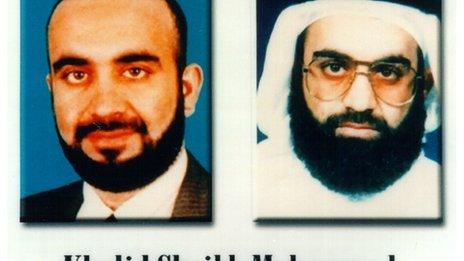Abu Hamza trial: ‘Supergrass’ informant testifies
- Published
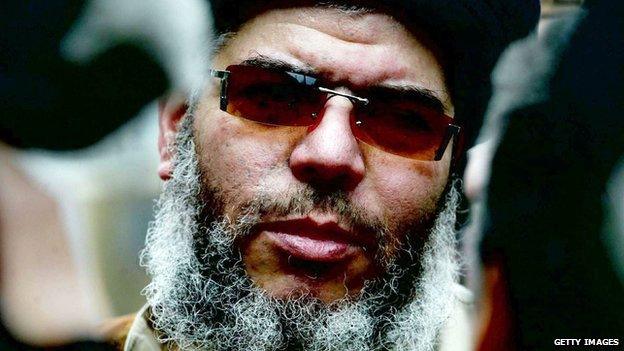
Abu Hamza, shown here in London in 2003, gave fiery speeches in London
UK authorities extradited Abu Hamza to the US in 2012. Now he is on trial in New York for terrorism offences.
Saajid Badat, a government witness in the terrorism trial, once worked on translations for al-Qaeda. One of his projects, a video about the 2000 bombing of the USS Cole, was shown earlier this week in a federal district courtroom in New York.
Abu Hamza, who was born Mustafa Kamel Mustafa, was watching the video in the courtroom. The video had been found at his property in England more than a decade ago.
He has been charged with being involved in a kidnapping conspiracy - the assault occurred in Yemen in 1998 - as well as with providing material support to al-Qaeda and helping to establish a training camp for militants in Bly, Oregon.
If convicted of the charges, he could be sentenced to 100 years in prison. He has pleaded not guilty.
At 56 he has broad shoulders and a paunch and looks like an aging nightclub bouncer, a job he once held in England. His hair is grey now. His reading glasses slip half-way down his nose.
Sitting at a table in London, Badat also watched the video. "These fighters are terrorists," he said. "They're happy."
Badat was arrested in Gloucester in November 2003 and afterwards was taken to London. "I decided to admit to everything in the car," he said this week.
He is known in British media as a "supergrass", a term that roughly translates into American English as "supersnitch".
He has testified in two previous US trials. He appears by video link in the trials, not in person, because he does not want to travel to New York. He is charged with terrorist offences and faces a life sentence in the US.
On video link he described meetings with Osama Bin Laden and Khalid Sheikh Mohammed, the self-described planner of the 9/11 plot, in Afghanistan.
Badat also spent time with shoe-bomber Richard Reid and Zacarias Moussaoui, known as the "20th hijacker".
Badat's testimony sounded like a who's who in the al-Qaeda organisation. "Supergrass strikes again," said a British journalist during a break in the trial.
Reid and Moussaoui both attended Finsbury Park mosque, the place in London where Abu Hamza once preached - a mosque that later became known as a "suicide factory".
In Afghanistan they all studied together. "We learned how to make poison that can anesthetise and also be fatal," Badat said. "The main poison would be cyanide."
While Badat was learning how to make weapons in Afghanistan, Abu Hamza was giving fiery speeches at the Finsbury Park mosque. His remarks bothered many people in the UK, including the Queen.
"She couldn't understand - surely there was some way to arrest him?" said BBC security correspondent Frank Gardner.
For better or worse Abu Hamza made a name for himself.
"He was the most notorious of the idealogues," said University of East London's Andrew Silke, who met him in Belmarsh prison several years ago while doing research for a book about terrorism.
"If you put up a picture to most people on the street they'd recognise him," Silke said. "He's essentially the poster child of extremists within the UK."
Abu Hamza is missing both hands and an eye. Because of his appearance, said a barrister, he has been turned him into a "pantomime villain". Writers for the Daily Mirror, external call him "Captain Hook".
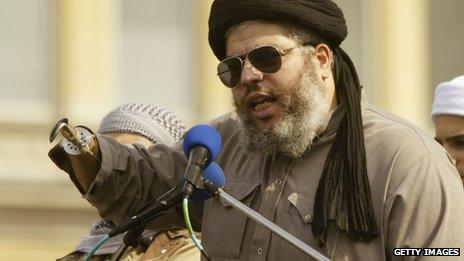
Abu Hamza, shown in London in 2002, was maimed in Afghanistan
In 2006 Abu Hamza was sentenced to seven years in prison in the UK for using his sermons to incite murder and other crimes. Some wonder why he was not put away for longer.
"I think he was very clever in knowing the limits of the law," said Richard Barrett, formerly of MI6 and now with a New York-based private intelligence firm, Soufan Group.
Edward Kim, a US federal prosecutor in the trial, said last week that Abu Hamza had managed to "hide in plain sight in London".
Barrett said that Abu Hamza was not only clever. He was also a show off.
"He's a big mouth, but unfortunately people turn up to listen. They don't see through him," said Barrett.
"Can you imagine him being a suicide bomber? Not in a million years," Barrett said. "But I can imagine him getting a kick out of convincing someone else to be a suicide bomber."
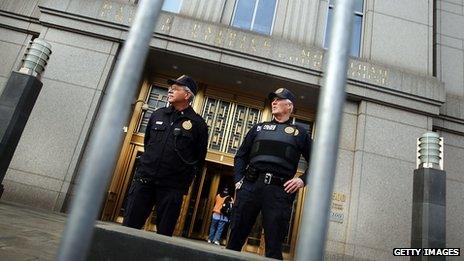
Abu Hamza is on trial in a courthouse that is near the site of the 9/11 attacks
Abu Hamza has changed his story over the years. At one point he told, external a reporter that he was injured while working on a road-building crew in Afghanistan - and a landmine exploded.
Later he said he was maimed while fighting in Afghanistan. Here in the US he said that the mishap occurred while he was during humanitarian work, according to Reuters, external.
"Pretty soon he'll say he lost his hands working in a soup kitchen," said a lawyer who came to watch the trial. Like many New Yorkers, the lawyer wants to see Abu Hamza convicted.
The judge, Katherine Forrest, wants to make sure he gets a fair trial.
She has expressed concern about how jurors will react to discussions about al-Qaeda and the Cole bombing. Their emotions, she wrote in a 15 April court order, may be "stirred".
Still she believes that evidence of different kinds, even when disturbing, should be presented. Whether inside or outside the courtroom, the spectre of al-Qaeda hovers over the trial.
On Monday morning a security guard looked out a window near the courtroom. He pointed to a steel-framed tower that has been built at the site of the former World Trade Center. A light at the top of the spire blinked every two or three seconds.
"I was there on 9/11," he said.
He and his colleagues were taking precautions for the trial. A dog with a white muzzle walked down the hallway that morning, its toenails clicking on the marble, as he sniffed for bombs.
The charges against Abu Hamza are hard to fight, according to legal experts.
Many of the offences are known as "inchoate crimes", said Kim Lane Scheppele, director of Princeton University's Program in Law and Public Affairs. These offences include conspiracy and providing money, personnel or other kinds of support for terrorists.
She explained: "That's where the US legal system loves to stick charges because they're easy to prove."
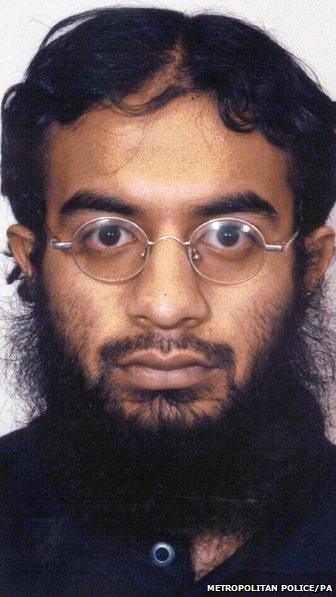
Badat got a hug from Bin Laden
Seen on the video link, Badat was dressed in a white, starched shirt and a tie.
He spoke in a London accent "with a bit of Midlands thrown in", said a British journalist in the courtroom. (Reporters for British publications filled two rows, a sign of interest in the case in the UK.)
Badat is from Gloucester and was once accepted at Imperial College in London, where he planned to study biochemistry. Then he went to Afghanistan.
While he was there, he spoke to Bin Laden about his plans to detonate explosives on an aeroplane. Their meeting, he said, "ended with him giving me a hug and wishing me luck in my mission".
Badat also met a man named Feroz Ali Abasi. Prosecutors say that Abu Hamza sent Abasi to see an al-Qaeda commander - and in this way provided support for the organisation.
Some time after Badat began speaking about al-Qaeda, Judge Forrest looked at the jurors. They had heard a series of graphic stories about plots to kill Americans, and she wondered how they were faring.
She reminded them that they would hear more testimony - and see more evidence. She said: "I want you to continue to keep an open mind."
- Published9 January 2015
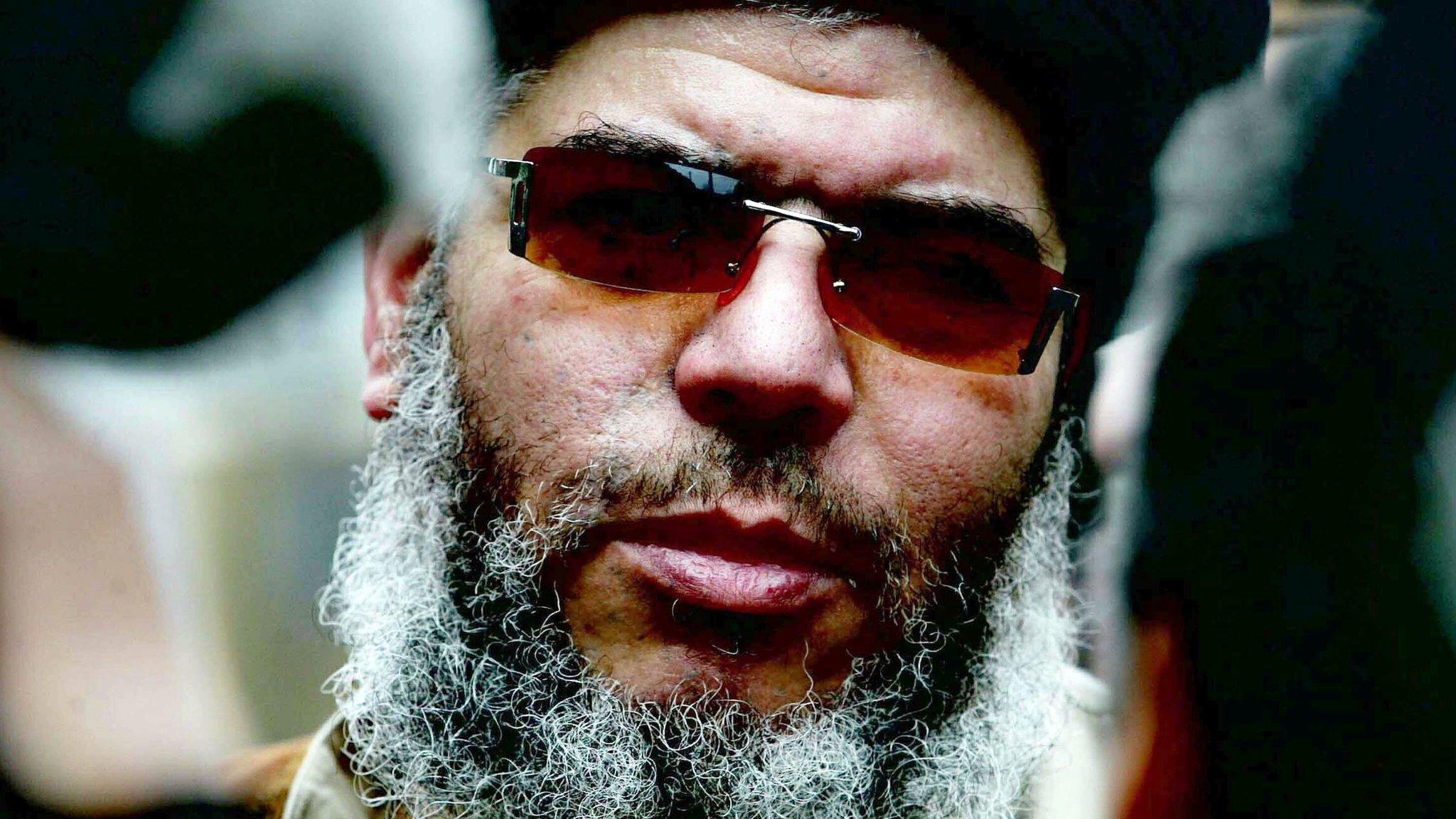
- Published5 October 2012
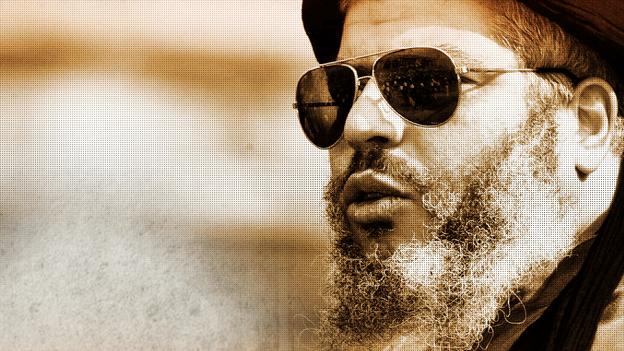
- Published11 September 2013
